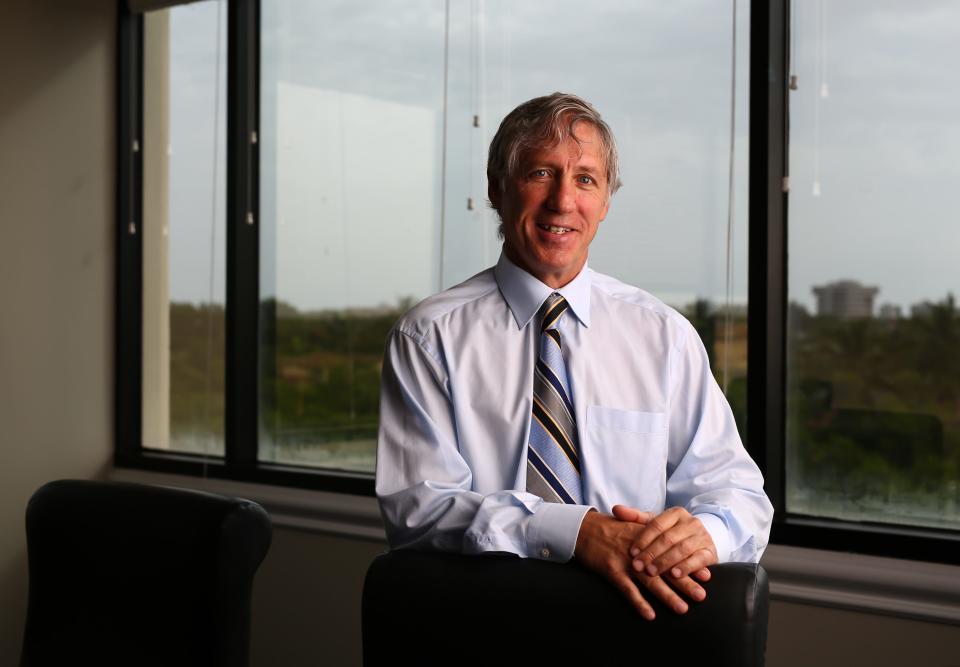Latest stops on Mark Emalfarb's 'impossible journey': A Jupiter restaurant, a COVID vaccine
JUPITER — What does a recently approved restaurant and office building project in Jupiter have to do with a vaccine for COVID-19, animal protein alternatives and enzymes?
The answer: a whole heck of a lot.
The owner of the company behind the newly approved development at Fisherman’s Wharf at Indiantown Road and the Intracoastal Waterway is the same who founded a Jupiter-based company that is working to revolutionize vaccines, including one for COVID-19.
Mark Emalfarb’s Dyadic International announced this month that it is collaborating with the Vaccine and Immunotherapy Center at Massachusetts General Hospital as part of a nearly $6 million U.S. Department of Defense program seeking a way to make vaccines quickly for infectious diseases including the flu.
How do you attack brain cancer? A world-class lab in Jupiter is trying something innovative.
The collaboration is a major step for Dyadic as it looks for more applications for its C1 gene expression platform, which has been shown to enable faster and more efficient vaccine and antigen production, Emalfarb said. Essentially, the platform takes information from a gene and uses fungal cells to create antigens.
“We expect this collaboration to further enhance key attributes of Dyadic’s C1 technology: the potential ability to develop and manufacture large quantities of vaccines in 100 days or less in a cost-effective manner at flexible commercial scales,” he said.
As his biotechnology company focuses on changing the world through low-cost, effective vaccines and other pharmaceuticals, his development company Fisherman’s Wharf Realty Limited Partnership recently received approval from the Jupiter Town Council for plans to build a restaurant and office space along Indiantown Road on land Emalfarb has owned for three decades.
The land is one of its last vacant parcels along Indiantown near the Intracoastal.

The plan includes a two-story restaurant with a tiki bar, a three-story office building and two boat mooring spaces with an 80-acre mangrove preserve on the waterfront property. There has already been interest in the restaurant space from local, regional and national brokers and restaurant chains, Emalfarb said.
His work to create treatments for diseases that are less expensive and more easily accessible is a far cry from landscaping rocks or even local commercial development.
Mark Emalfarb says career has taken him 'from blue jeans to genes'
Emalfarb’s journey to COVID-19 research followed an unconventional path — as he says, “I went from blue jeans to genes.”
It started in the 1980s when, as a young journalism school graduate, he began looking for a more efficient, cost-effective way to move lava rock for his father’s lawn and garden business.
While searching for that solution, he found that pumice stone was being sold in Europe to soften and fade denim to make it more fashionable and comfortable, he said. When Emalfarb returned home and told his father that this could be a new money making opportunity, his father replied, “You’ve got rocks in your head. Nobody’s gonna stick this in a washing machine.”
But Emalfarb persisted and soon started Dyadic to import pumice stone into the U.S. He taught major blue jeans brands how to use the stones to wash their products, making the clothes softer and increasing sales, he said.
“You could put on a pair of jeans and they actually fit and were comfortable, rather than washing it 35 times to get it that way,” he said.
'A place only for the wealthy': South Florida rents increase, but the hikes are normalizing after pandemic frenzy
When enzymes began to replace pumice stones in the jean-softening process, Emalfarb pivoted: Dyadic became a distributor for large enzyme companies.
In the 1990s, he decided it was time to develop his own enzyme. But he’s not a scientist — so he turned to the recently collapsed Soviet Union to look for scientists to bring his vision to life. He found scientists there who had been working on enzyme research that correlated to his goals.
That was the C1 enzyme, which the scientists would bring to the U.S. and develop for Dyadic, with research that led to a “serendipitous mutation” that led to hyper-productivity and better growth characteristics – essentially, the perfect combination for what Emalfarb needed, he said.
In the mid-2000s, Dyadic was on the cutting edge of biofuel research, using the C1 enzyme to turn the biomass from corn stalks into ethanol or other chemicals instead of oil, Emalfarb said.
After DuPont bought Dyadic’s industrial technology business for $75 million in 2015, Emalfarb said Dyadic began exploring C1’s pharmaceutical applications.
One of his current goals is to speed up the production and lower the cost of pricy biologic treatments, whether it be an antigen that is used in a vaccine or treatment for a debilitating disease.

Dyadic has been working on vaccine development since before the COVID-19 pandemic, he said. The company was involved in several research studies leading up to and during the pandemic where its vaccines were shown to be effective and easy to produce, Emalfarb said.
One of those studies was a five-year program funded by the European Union that included big names in research and development such as Merial and Astra Zeneca. The goal of the program, which launched in 2015, was to create platforms to fight new infectious diseases that may emerge. The C1 platform was chosen in the program to produce antigens for two viruses, Emalfarb said.
This year, Dyadic released research showing it had, for the first time in a human being, demonstrated that a protein produced by its C1 platform could be used to safely make vaccines for human use, he said.
“For us, it’s about a more efficient, faster, lower-cost way of making a vaccine,” Emalfarb said. “So now, what can we use it for? HPV, or shingles, or RSV or influenza or Dengue (fever) or Zika or one of the 50 other things that people want to make? Maybe even cancer vaccines.”
How Palm Beach County is growing: Rooneys strike deal to sell Palm Beach Kennel Club land to developers
One of the benefits of using Dyadic's platform for vaccine production: health equity, he said, adding that he feels the COVID-19 pandemic and the lack of worldwide access to a vaccine highlighted the inequities in the health care system.
“We have a platform now that can lower the cost and improve the access of vaccines for the world,” he said, noting that he is working with organizations internationally, including in Bangladesh, India and South Africa, to produce COVID-19 vaccines for distribution in those countries.
Where the commonly used mRNA COVID-19 vaccine – which is produced using a different platform that teaches cells how to make the proteins that trigger an immune response to fight the virus – is more expensive and requires extremely cold temperatures for transportation, the C1 platform-produced vaccine is less expensive and can be transported in a common refrigerated container or cooler, Emalfarb said.
“It’s not about the profit motive,” he said. “It’s about enabling the world to have health care, which is supposed to be an unalienable right to human beings.”
Dyadic's next frontier: Alternative proteins for use in foods
Dyadic also recently announced that it licensed its Dapibus protein-production system for use in the design and development of animal-free dairy enzymes for commercial use.
“A lot of the world is looking for alternatives to animal proteins, whether that be for cheese or dairy or yogurt, or even meat,” Emalfarb said.
While the synthetic protein may not be exactly the same, it will be closer to the real thing than when plants are used as an alternative, he said.
“Basically in theory, it will give it the same flavor, texture and taste,” Emalfarb said.
The cost of housing: Affordability advocates want zoning changes, but will Palm Beach County adopt them?
He referenced the stated goals of biotechnology to heal, fuel and feed the world, with the company’s work in the pharmaceutical space, past work in biofuels and recent enterprise into alternative proteins.
“We sort of are the poster child for the biotech industry, because we’re hitting on all of the avenues for biotechnology,” he said.
The journey to where he is from where he was — selling pumice stones to blue jean makers — has been amazing, he said.
“It’s an impossible journey that never could happen in the real world, but it did,” he said. “I think about it sometimes and wonder, ‘How the hell did you get here?’”
This article originally appeared on Palm Beach Post: Dyadic CEO's many projects range from restaurant to COVID vaccine

